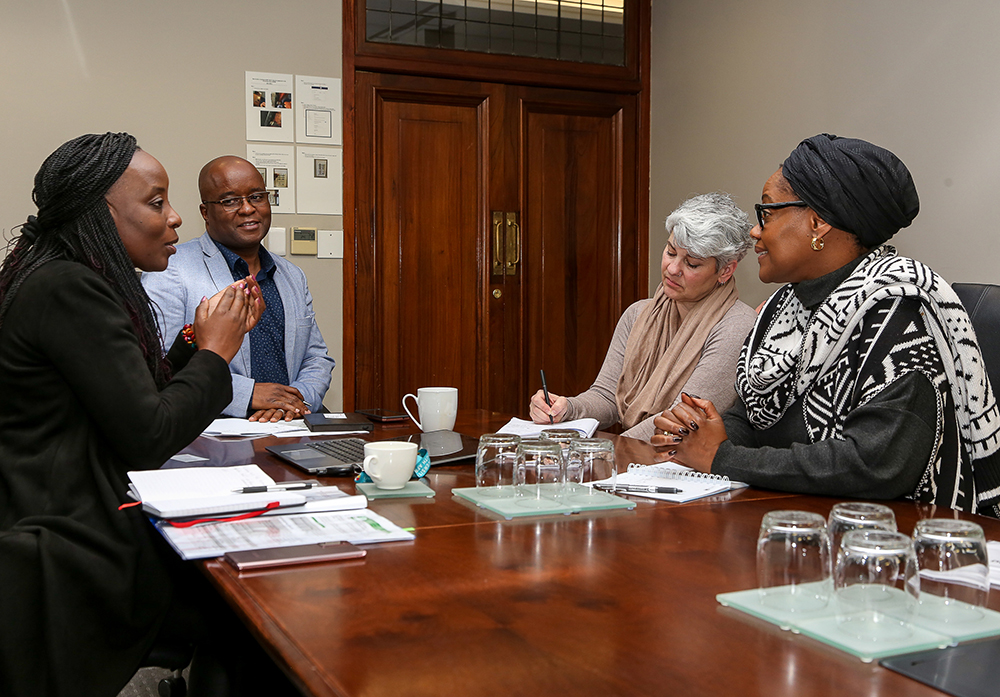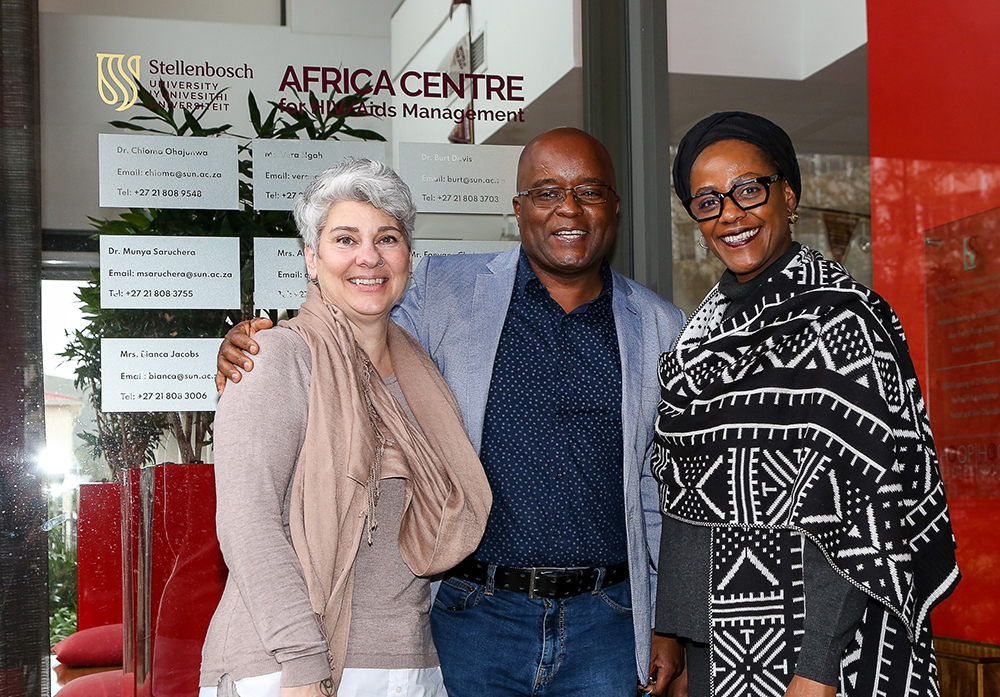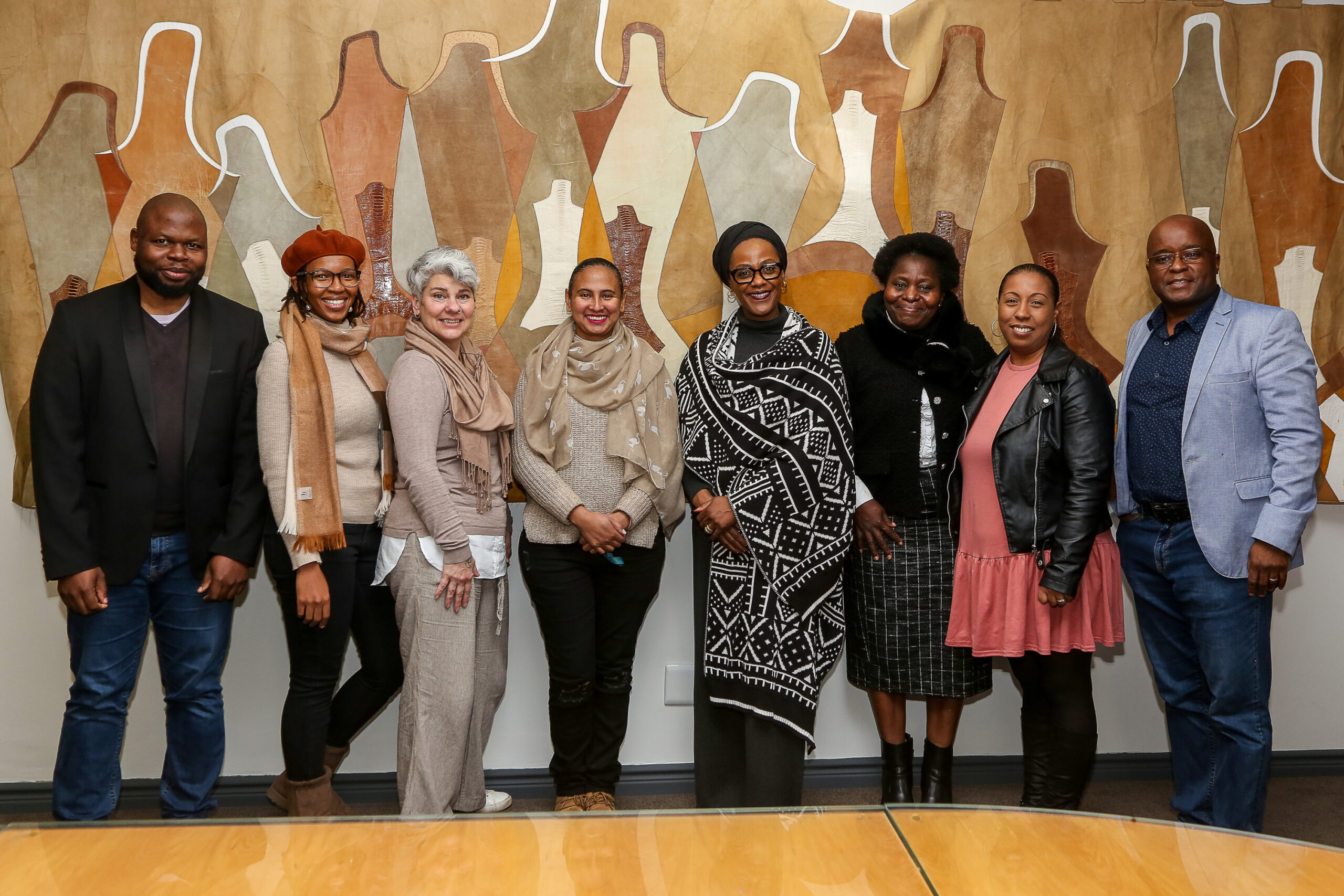
Collaboration in action ─ from left to right are Prof Sibusiso Moyo and Dr Munya Saruchera from SU, and representing UNAIDS are Jennifer Baumann and Eva Kiwango.
FOLLOWING a supportive relationship of more than two decades between Stellenbosch University’s Africa Centre for HIV/Aids Management and UNAIDS, two senior officials from this esteemed international institution visited SU for the first time on 14 June to discuss further collaboration.
Ms Eva Kiwango (UNAIDS South Africa country director) and Ms Jennifer Baumann (UNAIDS South Africa senior strategic information advisor) were hosted by Prof Sibusiso Moyo (deputy vice-chancellor: Research, Innovation and Postgraduate Studies) and Dr Munya Saruchera (interim director of the Africa Centre) during the visit. Kiwango was the keynote speaker at the Africa Centre’s Postgraduate Diploma in HIV/Aids Management summer school in February last year and the “Master your master’s” workshop for MPhil students in April this year.
“It was wonderful to meet and receive Ms Kiwango and Ms Baumann,” Moyo said. “Stellenbosch University’s connections with organisations like UNAIDS, for whom research and innovation are crucial, must be cherished and strengthened.”
She added that the timing of the visit was perfect, since SU is collaborating with a number of African and European universities to tackle the four key areas identified in the AU-EU Innovation Agenda ─ public health, green transition, innovation and technology, and capacities for science. “We look forward to strengthening the partnership that the Africa Centre has cultivated with UNAIDS over many years through several initiatives that are not limited to only HIV/Aids-related research and skills training but various health initiatives, in collaboration with the broader UN.”
The meeting discussions revealed the potential of greater collaboration between the UN’s agencies in South Africa dealing with social, political and economic determinants of health at some level and SU’s wide-ranging initiatives on science and health management and related, topical aspects such as climate change and digital health. This improved collaboration and data sharing, both at SU and with the UN, can have a substantial positive impact on the university’s health research outputs.
Optimising research efforts is the foundation of sustainable change
After discussing the potential of cooperation with the UN to streamline SU’s broader health initiatives, the UNAIDS representatives moved to the Africa Centre to explore the way forward for this longstanding partnership. UNAIDS has provided several grants to the Africa Centre over the past 24 years, with the most recent being research grants allocated in 2019 and 2021 respectively for conducting impact case studies of people-centred and community-led HIV and sexual reproductive health services delivery in east and southern Africa. These research grants play a crucial role in enabling the centre to continually deliver on its research-related mandates.
“Sub-Sahara Africa continues to have the highest incidence of HIV and Aids in the world. Localised, targeted research remains the first step in identifying and addressing the key challenges and obstacles related to the pandemic, broader health and related issues like climate change, equity, financing and data for impact,” Saruchera said. “Access to the latest international expertise, made possible via global collaborations such as ours with UNAIDS, enables us to optimise our research efforts and the implementation of our findings to bring about sustainable change.”
One of the key objectives of the meeting was for the Africa Centre to secure additional grant funding, mainly for MPhil and PhD student bursaries. Funding will also be used for research across southern Africa, focusing on selected, topical HIV/Aids-related and general health issues. These include community-led HIV monitoring, HIV and ageing, HIV and youth not in education or employment, equitable access to treatment for children born with HIV, HIV prevention and treatment, stigma and suicide among female youth, unequal health investments and budgets, and the dynamics between health (with a focus on HIV/Aids and TB), corruption and climate change.
The Africa Centre offers some of the most comprehensive HIV/Aids management training programmes globally. These capacity-building courses empower people, organisations and communities to take control of the pandemic, from an individual to management level. Apart from its postgraduate programmes, the centre partners with local, national and international institutions (like UNAIDS) to undertake research on a range of issues around HIV/Aids and the world of work.
Considering that SU’s vision for 2040 is “Forward together”, the existing partnership between the Africa Centre and UNAIDS combined with the vast potential for collaboration between SU and the broader UN is perfectly aligned with the university’s aspirations.

At its core, physical and mental health is about being human, which is why it’s only fitting that the meeting attendees grabbed a moment to embrace their fun, human side to take a selfie.

Brightening up a rainy Stellenbosch winter’s day: Dr Munya Saruchera and Bianca Jacobs from the Africa Centre for HIV/Aids Management present Eva Kiwango with a beautiful bunch of flowers.

A visit to the Winelands has to include some of its produce, with a story about the Laan, where Maties through the years have spent many memorable times.

After discussing broader collaboration and strategies between SU and the UN, the UNAIDS representatives visited the Africa Centre for further discussions on how the organisation can support the centre’s work and research.

The Africa Centre and SU team members with the UNAIDS visitors. From left to right are Dr Munya Saruchera, Bianca Jacobs, Dr Juliet Nyasulu (health systems technical specialist at SU’s Division of Health Systems and Public Health), Eva Kiwango, Yolande Barendse, Jennifer Baumann, Refilwe Mmakola and Fanyane Chabalala.
